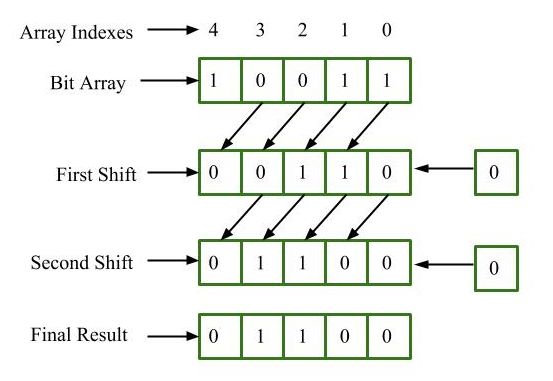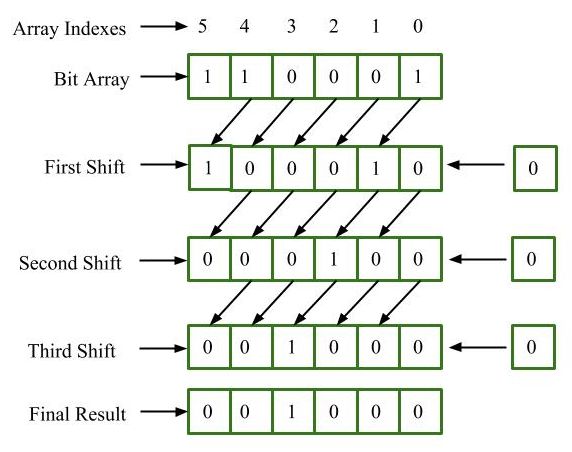BitArray类管理一个位值数组,这些值表示为布尔值,其中true表示bit为1,false表示bit为0。此类包含在名称空间System.Collections中。 BitArray.LeftShift(Int32)方法用于将位数组的位向左移动一个位置,并在已移动的位置加上零。执行左移操作时,将修改原始BitArray对象。
用法: public System.Collections.BitArray LeftShift (int count);
参数:
count 是一个不可变的值类型,表示带符号的整数,值的范围为负2147483648至正2147483647。
返回值:它返回位数组。
示例1:假设我们有位数组10011,我们想将其向左移动两个位置。

最终结果是00110。
// C# program to illustrate the
// BitArray.LeftShift() Method
using System;
using System.Collections;
class GeeksforGeeks {
// Main Method
public static void Main()
{
// Creating a BitArray
BitArray BitArr = new BitArray(5);
// Initializing values in BitArr
BitArr[0] = true;
BitArr[1] = true;
BitArr[2] = false;
BitArr[3] = false;
BitArr[4] = true;
// function calling
Display(BitArr.LeftShift(2));
}
// Displaying the result
public static void Display(IEnumerable myList)
{
foreach(Object obj in myList)
{
Console.WriteLine(obj);
}
}
}
输出:
False False True True False
示例2:假设我们有位数组100011,我们想将其向左移动三个位置。

最终结果是000100。
// C# program to illustrate the
// BitArray.LeftShift() Method
using System;
using System.Collections;
class GeeksforGeeks {
// Main Method
public static void Main()
{
// Creating a BitArray
BitArray BitArr = new BitArray(6);
// Initializing values in BitArr
BitArr[0] = true;
BitArr[1] = false;
BitArr[2] = false;
BitArr[3] = false;
BitArr[4] = true;
BitArr[5] = true;
// function calling
Display(BitArr.LeftShift(3));
}
// Displaying the result
public static void Display(IEnumerable myList)
{
foreach(Object obj in myList)
{
Console.WriteLine(obj);
}
}
}
输出:
False False False True False False
参考:
相关用法
- C# MathF.Exp()用法及代码示例
- C# MathF.Cos()用法及代码示例
- C# MathF.Tan()用法及代码示例
- C# MathF.Abs()用法及代码示例
- C# MathF.Min()用法及代码示例
- C# MathF.Sin()用法及代码示例
- C# MathF.Pow()用法及代码示例
- C# MathF.Log()用法及代码示例
- C# MathF.Max()用法及代码示例
- C# MathF.Cbrt()用法及代码示例
- C# Char.GetTypeCode()用法及代码示例
- C# Char.GetHashCode()用法及代码示例
- C# MathF.Atan()用法及代码示例
- C# BitArray.RightShift()用法及代码示例
- C# Int16.GetTypeCode用法及代码示例
注:本文由纯净天空筛选整理自AmanAgarwal6大神的英文原创作品 BitArray.LeftShift() Method in C# with Examples。非经特殊声明,原始代码版权归原作者所有,本译文未经允许或授权,请勿转载或复制。
